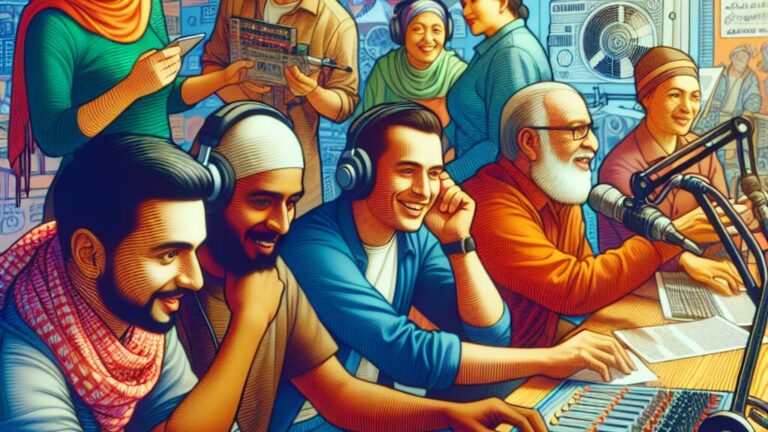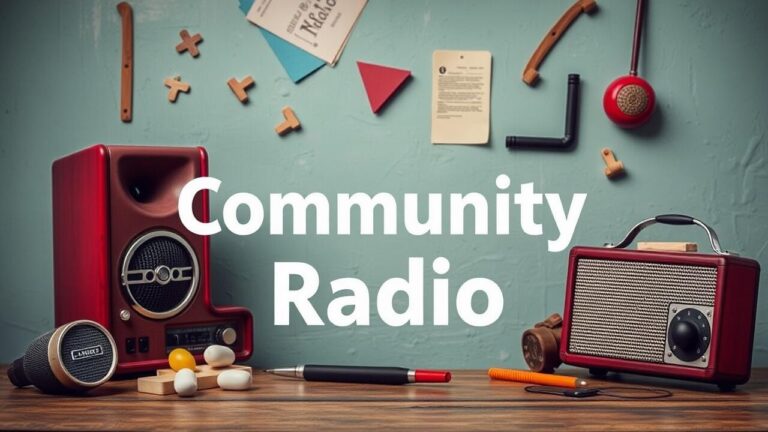What Programs Can Community Radio Offer
Table Of Contents
Key Takeaways
- Understand the fundamental idea behind Community Radio stations and their purpose in society.
- Discover the diverse range of programs that Community Radio can provide to listeners.
- Learn about the unique qualities and advantages that Community Radio stations offer.
- Explore how Community Radio plays a crucial role in serving the needs and interests of local communities.
- Get insights into the essential steps to establish and operate a Community Radio station successfully.
Exploring the Core Concept of Community Radio
Community radio is a dynamic platform that plays a pivotal role in amplifying the voices of marginalized groups and fostering inclusive dialogues within local communities. With a focus on democratization and participation, community radio stations provide a diverse range of programs that cater to the unique needs and interests of their audience. From educational shows to cultural showcases, community radio offers a variety of content that bridges gaps, sparks conversations, and promotes mutual understanding. Through partnerships, volunteer engagement, and listener feedback, community radio stations are able to fine-tune their programming to better serve their service area and strengthen community ties. The eclectic mix of programs offered by community radio stations truly showcases the power of grassroots media in creating meaningful connections and empowering voices that often go unheard.
Definition and Importance of Community Radio
Community radio is a form of media that focuses on local interests, concerns, and cultures. It provides a platform for underrepresented voices and minority language presenters to share their stories and perspectives with the community. Community radio stations often offer a diverse range of programs, including music shows, talk programs, and special event coverage, catering to the unique needs and preferences of the local audience.
The importance of community radio lies in its role as a tool for community empowerment and engagement. By encouraging local interaction and strengthening community ties, radio broadcasts foster a sense of belonging and unity among residents. Community radio stations also serve as a vital source of information, entertainment, and reflection for the community, playing a significant role in promoting social cohesion and building a sense of shared identity.
The Transformative Impact of Community Media
Community media plays a pivotal role in promoting social change and fostering community engagement. The transformative impact of community radio stations lies in their ability to offer a diverse range of programs that cater to the unique interests and needs of local listeners. From educational shows to cultural programs, community radio stations serve as a platform for dialogue and interaction among community members. These stations go beyond conventional media outlets by providing a space for marginalized voices to be heard, empowering listeners to actively participate in community development work.
The presence of community radio stations also contributes to the democratization of media, enabling communities to share their stories and advocate for important issues. By offering a platform for dialogue and collaboration, these stations create opportunities for local initiatives, campaigns, and discussions to thrive. The impact of community media extends beyond traditional broadcast content, as radio producer engage with listeners to address social realities and promote inclusivity. Through innovative programming and grassroots initiatives, community radio stations play a crucial role in fostering social cohesion and empowering local communities.
Identifying Varied Programs on Community Radio
Community radio stations offer a diverse range of programs that cater to the specific needs and interests of local communities. These programs can include daily shows that provide valuable information and entertainment, special event broadcasts that celebrate important occasions, and music programs that showcase local talent. By offering such varied content, community radio stations play a vital role in the development of society by fostering partnerships and creating a platform for voices to be heard. With the advent of technology, community radio stations can now reach a wider audience through internet streaming, audio applications, and community television collaborations. Through these platforms, community radio stations can continue to positively impact community life and strengthen ties among families and individuals.
- Talk shows that discuss local issues and community concerns
- Educational programs that aim to inform and enlighten listeners
- Cultural shows that celebrate the diversity and heritage of the community
- Health and wellness programs that promote well-being and healthy living
- News bulletins to keep the community updated on current events
Insight into Daily Programs Broadcasted
Community radio stations offer a diverse range of programs catering to a broad audience base. These programs span various genres such as music, culture, and youth work, contributing to the station’s impactful role in fostering innovation and community ties. From morning talk shows providing agriculture information services to evening segments dedicated to mass communications programs, community radio broadcasts hold substantial meaning for listeners seeking relevant, engaging content throughout the day.
In addition to entertainment, community radio stations are instrumental in providing educational content to their audience. Shows focusing on youth services and community participation serve as valuable resources for local communities. Whether it’s airing informative documentaries or featuring guest speakers discussing current affairs, these daily programs play a crucial role in promoting learning opportunities and addressing societal problems within the community.
Special Event Programming
Community radio stations can offer a diverse range of programs to cater to the varied interests of their audience. From educational shows to cultural discussions and music exploration, community radio programming aims to engage listeners and provide them with valuable information and entertainment. Special event programming, such as live coverage of local festivals, garage sales, and charity events, allows community radio stations to connect with their listeners on a more personal level. By broadcasting these events, stations can foster a sense of community spirit and encourage participation and support for local initiatives.
Community radio stations play a crucial role in filtering and broadcasting programs that align with the needs and interests of the local community. By programming a mix of music, interviews, and discussions, stations can create a vibrant and engaging listening experience for their audience. Additionally, special event programming provides a platform for showcasing local talent, highlighting community achievements, and promoting important social issues. Through diverse and engaging programing, community radio stations can effectively connect with their listeners and address the unique needs and interests of the community they serve.
Characteristics and Benefits of Community Radio Stations
Community radio stations offer a diverse selection of programs that cater to various interests and demographics in their local areas. From daily news stories to special event programming, community radio provides a platform for local voices and stories to be heard. These stations often feature unique traits reflective of their communities, aiming to positively influence and strengthen community ties through radio broadcasts. By encouraging local interaction and engagement, community radio stations serve as vital platforms for communication and community development.
Unique Traits of Community Radio Stations
Community radio stations possess unique traits that set them apart from commercial or mainstream radio. These stations often have a diverse range of programs catering to the specific interests and needs of their local community. From music shows to talk programs, community radio offers a platform for various voices and viewpoints to be heard. Engineers play a crucial role in ensuring the smooth operation of these stations, from managing technical aspects to troubleshooting any issues that may arise. The structure of community radio stations is often more flexible, allowing for programming that may not adhere to traditional timeslots seen in commercial radio. This flexibility enables stations to offer a platform for many individuals to share their passion and expertise on airwaves, encapsulating the true spirit of community radio.
In addition to diverse programming, community radio stations also prioritize community engagement over profit-making. Station managers and program hosts work closely with members of the local community to create content that resonates with their interests. These stations often place a strong emphasis on promoting social causes and fostering a sense of belonging among listeners. By going beyond traditional broadcasting boundaries, community radio stations like Tim Russo’s station provide platforms for underrepresented voices and viewpoints to be heard. Through initiatives like social media case studies and interactive programming, these stations showcase the power of grassroots media in building community ties and addressing local challenges.
| Station Name | Location | Program Diversity | Community Engagement |
|---|---|---|---|
| Radio Free Brooklyn | New York, USA | Music, Talk Shows, Cultural Programs | Collaboration with Local Artists and Organizations |
| Radio Regen | Manchester, UK | Youth Programs, Community News, Mental Health Awareness | Interactive Workshops and Events |
| RadioActive | Seattle, USA | Environmental Shows, Indigenous Voices, LGBTQ+ Programs | Partnerships with Community Centers and Schools |
| Radio Adelaide | Adelaide, Australia | Local Music, Multicultural Programs, Health Education | Community Forums and Listener Feedback Sessions |
The Positive Influence of Community Radio Stations
Community radio stations have a profound impact on society, offering a plethora of diverse programs tailored to meet the needs of local communities. These programs provide a space for engagement, self-management, and the exchange of knowledge among adults and youths alike. From hosting shows on niche interests like chart nerd or zi��n�jp��� to organizing community activities and raising awareness on important topics, community radio serves as a platform for learning, entertainment, and social connectivity. By fostering a sense of enthusiasm and connectivity, these stations play a vital role in strengthening community ties and combatting feelings of isolation and disconnect.
One of the merits of community radio stations lies in their ability to create a sense of belonging and empowerment among community members. These stations often emerge as a response to the commercialism and lack of minority representation in mainstream media, offering a platform for diverse voices and perspectives to be heard. Through their non-commercial nature and focus on community-mindedness, community radio stations promote social cohesion and civic engagement. By allowing community activists, academics, and local residents to host shows and share their expertise, these stations become a hub for knowledge-sharing, cultural exchange, and advocacy for social issues.
How Community Radio Serves Local Communities
Community radio plays a pivotal role in serving local communities by offering a diverse range of programs that cater to the unique interests and needs of its audience. From educational shows to music history segments, community radio stations like Jozi FM and Hill Radio provide a platform for self-expression and upliftment. Through community events, interviews, and special event programming, these stations strengthen community ties and engage listeners in meaningful discussions. By encouraging local interaction and engagement, community radio operators gain the trust and commitment of their audience, making them a vital source of information and entertainment within their respective regions.
Encouraging Local Interaction and Engagement through Radio
Community radio plays a pivotal role in encouraging local interaction and engagement through radio broadcasts. By offering diverse programs that cater to the needs and interests of community members, community radio stations create a unique space for dialogue and connection. From news programming to special event coverage, community radio serves as a platform for sharing information and fostering solidarity among residents. What Programs Can Community Radio Offer? These stations can provide a wide array of content, including music shows, talk programs, cultural discussions, and educational segments, catering to the varied tastes and preferences of audiences.
By broadcasting content that reflects the interests and concerns of the local community, community radio stations elevate the status of neighborhood voices in the media world. Unlike mainstream outlets or newspapers, community radio stations offer a platform for community members to share their stories, perspectives, and insights. Through programs that focus on the daily realities of residents, community radio stations serve as a vital ground for showcasing the diversity and richness of local cultures and traditions, creating a sense of belonging and empowerment among listeners.
- Creating interactive talk shows and panel discussions that involve community members
- Featuring local artists and musicians to showcase talent and promote cultural appreciation
- Hosting educational segments on important topics such as health, education, and community resources
- Organizing live broadcasts from community events and festivals to increase participation
- Providing platforms for local businesses and organizations to advertise and connect with residents
Strengthening Community Ties with Radio Broadcasts
Community radio plays a pivotal role in strengthening community ties through its diverse programs. Community radio stations offer a wide array of programs catering to various interests and preferences of the local audience. From music shows like “Trivia Rock” to informative segments for parents and educational programs such as “History Teacher,” community radio provides a choice of content that appeals to individuals from different backgrounds. These programs create a sense of companionship among listeners, fostering a unique bond within the community.
Furthermore, by adhering to broadcasting regulatory policies and prioritizing the suitability of content, community radio stations such as “Croke Park” or “Narsamma” can effectively serve local communities. Whether it’s celebrating local traditions, discussing important community issues, or showcasing local talent, community radio broadcasts reflect the diverse voices and perspectives of the community members. By offering a platform for discussions, sharing stories, and connecting people, community radio stations become a beacon of unity and empowerment in the local area.
Roadmap to Starting a Community Radio
When embarking on the journey of launching a community radio station, it is essential to consider the diverse range of programs that such stations can offer. Community radio provides a platform for training modules and sounds that reflect the voices of the community people, aiming to increase @j. and ј% among listeners. What Programs Can Community Radio Offer is a fundamental question that shapes the programming lineup, including aj��t, marketing spares, and unique shows tailored to the local audience. By understanding the needs of the community and utilizing a variety of program formats, new stations can effectively engage their audience and create a sense of shared ownership within the community.
The Essential Steps to Launch Your Own Station
Community radio stations play a vital role in serving local communities by offering a diverse range of programs that cater to the unique needs and interests of their listeners. These stations can provide a platform for a wide variety of content, including news, music, talk shows, educational programs, and much more. This diversity allows community radio to foster a sense of community and connection among its audience members while empowering them to engage with issues that matter to them. Initiating a community radio station involves a series of essential steps, such as securing funding, assembling a dedicated team, setting up a studio, acquiring necessary equipment, and obtaining the required licenses to commence broadcasting.
Conclusion
When considering the diverse range of programs that community radio can offer, it becomes evident that the possibilities are truly endless. From daily shows that delve into local issues and events to special event programming that captures the essence of community celebrations, community radio serves as a conduit for dialogue and engagement. Whether it’s teenagers hosting their own show, local musicians showcasing their talents, or community leaders discussing important topics, community radio stations provide a platform for everyone to have their voices heard. By catering to the interests and needs of the local population, community radios create a unique space for connection and self-empowerment.
FAQS
What types of programs can community radio stations offer?
Community radio stations can offer a diverse range of programs catering to the interests and needs of the local community. This can include music shows, talk shows, news updates, cultural programs, educational content, health and wellness programs, and more.
How are programs on community radio different from commercial radio stations?
Programs on community radio are typically more localized, community-driven, and focused on serving the specific needs of the local population. They often provide a platform for underrepresented voices and address issues relevant to the community.
Can individuals from the community contribute to programs on community radio stations?
Yes, community radio stations often encourage participation from local residents, allowing them to host their own shows, share their expertise, and contribute content that reflects the diversity of the community.
Are there specific guidelines or regulations for the types of programs that can be broadcasted on community radio?
While there are regulations that govern the content broadcasted on community radio stations, they generally have more flexibility compared to commercial stations. Programs should adhere to community radio values of inclusivity, diversity, and serving the public interest.
How can community radio stations ensure that their programs are relevant and engaging for their audience?
Community radio stations can conduct regular community needs assessments, solicit feedback from listeners, involve community members in program planning, and collaborate with local organizations to ensure that their programs address the interests and concerns of the community.







